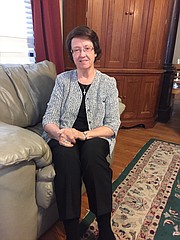MEMPHIS—The two-story, century-old house sits on a hill next to a vacant lot on Poplar near Cleveland, between downtown and midtown. A Buddhist temple is nearby, and so is the Sacred Heart Church, which holds masses in Vietnamese and Spanish. Beggars with rickety grocery carts wander the pockmarked streets, glancing up at cars that only stop when the light turns red.
When Memphis, Tenn., native Polly Jones walks into that house on the hill, she feels something she doesn't feel anywhere else in the city. "There's not a lot of love in my city," says the 22-year-old homeless single mother of two toddlers, boys aged 2 and 3. "This house, I would rather be here than anywhere else right now."
Jones and her boys have been at the Dorothy Day House of Hospitality at 1429 Poplar Ave. since May. She plans to leave next February after getting her GED and a fresh start on a new life that includes a future career as a surgical nurse. "I want to better myself for my kids. ... Everything they do for you here is for the better. When you come here, you come with a goal," she says.
The Jones family is one of three families at the Dorothy Day House, the only refuge for homeless families in this predominantly black city of 650,000, the nation's poorest large metropolitan area. Half the children in Memphis are poor. The city's other missions limit themselves to either men or women.
"The whole idea of a Dorothy Day house is to answer a need that's not being met," says Sister Maureen Griner, executive director. "It's the hope you bring to people who are really desperate. By the time people get here, they don't have pocket change, evicted, probably living in a car. ... People don't think about homeless families. There are hundreds in this city every night."
Jones came to the Dorothy Day House after a series of life's blows. She lost both her mother, who had drug problems, and the grandmother who reared her in 2011. "That was a tremendous putdown, and I was pregnant with my first son," she says. "I didn't know my biological father."
She did factory work for a while, but her younger son's asthma kept pulling her away to take care of him. "It was hard. I kept getting discouraged. When you are a mother, you have choices to make. ... I made my son my priority," she says.
The house on Poplar Avenue is one of more than 185 Catholic Worker communities around the world. Each is independent in its commitment to voluntary poverty, prayer and nonviolence, and in its outreach to the poor and marginalized of society. Other than the occasional grant, they all depend on private contributions with little or no support from government or sometimes even the Catholic Church.
Dorothy Day, who died at 83 in 1980, was the radical journalist who co-founded the Catholic Worker Movement with French peasant, poet and prophet Peter Maurin. With inspiration from the teachings of Jesus and Catholic tradition, they launched the Catholic Worker newspaper and first hospitality house in New York City at the height of the Great Depression in 1933.
"What we do is very little, but it is like the little boy with a few loaves and fishes," Day once wrote. "Christ took that little and increased it. He will do the rest. ... Our work is to sow. Another generation will be reaping the harvest."
In the mid-1930s, Day traveled to Memphis, where she championed the "dispossessed" members of the embattled Southern Tenant Farmers Union (see my column in the Jackson Free Press, July 1-7 edition).
"I saw men, women, and children herded into little churches and wayside stations, camped out in tents, their household goods heaped about them, not one settlement but many ... children ill, one old man dead in bed and not yet buried, mothers weeping with hunger and cold," she wrote.
Sister Maureen, 68, a native of Louisville, Ky., who helped found the Dorothy Day House in Memphis 10 years ago, is Day's work alive. The house is only big enough for three families, and she and her small staff have to turn away as many as 10 families a week. Still, they've helped more than 40 families get back on their feet over the past decade, and she envisions a "Dorothy Day Village" in the future.
"It's painful to turn people away," she says. "Dorothy Day said put a pot of coffee on the stove and a pot of soup, and God will take care of the rest."
Joe Atkins is a veteran journalist, columnist and professor of journalism at the University of Mississippi. His blog is laborsouth.blogspot.com. Email him at jbatkins@olemiss.edu.



Comments
Use the comment form below to begin a discussion about this content.